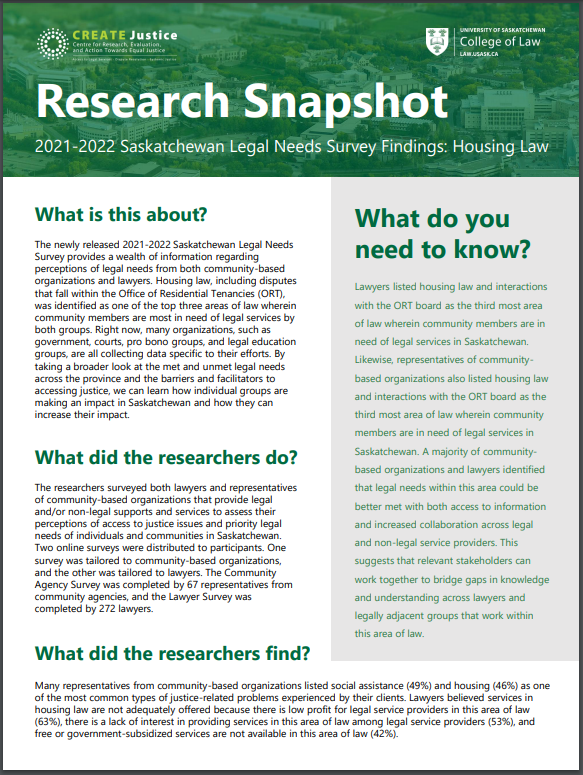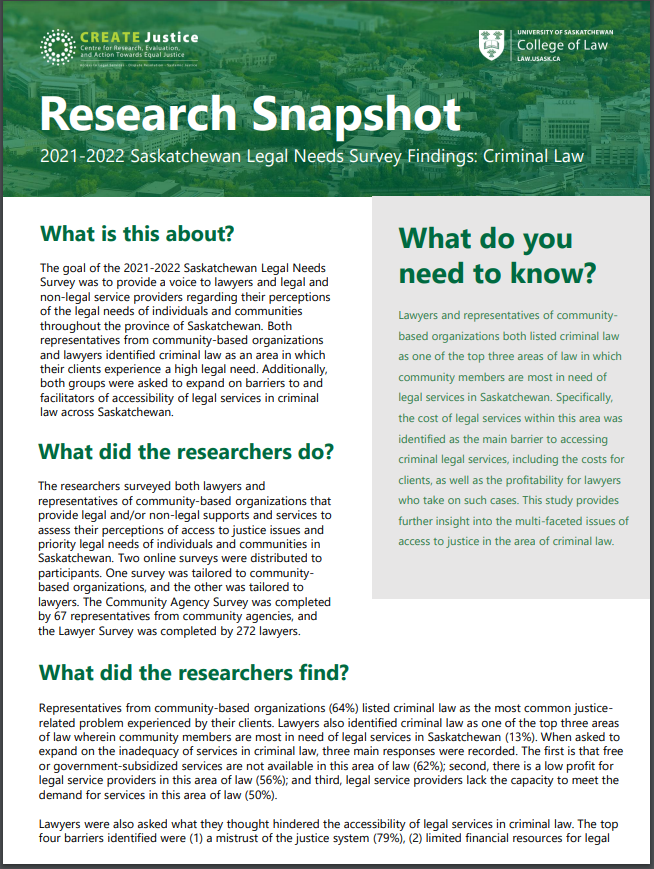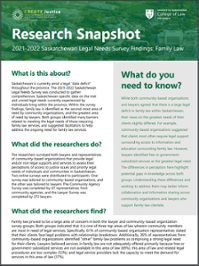Project background: The initial steps towards Saskatchewan’s first legal needs survey
Research Snapshots: Legal Needs Assessment
A quick look at the project (Click each snapshot above to enlarge)
Starting in May of 2019, CREATE Justice took the first steps in turning the discussions of a legal needs assessment for Saskatchewan into reality. The first task was to learn as much as possible about the tools to achieve this, specifically, legal needs surveys. It started with an in-depth reading of the OECD Guide: Legal Needs Surveys and Access to Justice so as to understand what exactly legal needs surveys are and how they can be implemented.
Through reading this document, it became clear that there was a number of initial questions that would need to be answered before the actual development of the survey could begin. At that point, a scan of already existing surveys that had been done around the world was commenced. The scan included 22 surveys from 18 jurisdictions which yielded information regarding objectives, methodology, and categories.
This research sparked discussions which led to the identification of a need to understand what research on legal needs in Saskatchewan currently existed. A deeper look was done into the latest Canada-wide survey which demonstrated that Saskatchewan made up an insignificant percentage of respondents, making the data of limited usability in informing specific policy decisions.
Discussions with access to justice stakeholders revealed that many organizations (like government, pro bono groups, legal education groups, and courts) were collecting data related to their own access to justice initiatives, but that no broad scope data existed. Combining the information gained from the legal needs scan and taking stock of the current research and data collection in Saskatchewan led to the decision that a legal needs survey is the best tool to gain a more comprehensive picture of the legal needs of Saskatchewan residents.
Currently, the survey has moved into the development stage, which includes designing questions, considering methodology, and engaging survey and data collection partners.
Find more information about what a legal needs survey is and how it will impact Saskatchewan. This document was presented at the a bi-annual access to justice stakeholder meeting in June 2019.
About the project
Collaborators: Centre for Forensic Behavioural Science and Justice Studies (Lisa Jewell/Bryce Stoliker, the Forensic Centre), the Centre for Research, Evaluation, and Action Towards Equal Justice (Heather Heavin/Brea Lowenberger), and the Law Society of Saskatchewan
The Legal Needs Assessment for Saskatchewan aims to increase access to justice for Saskatchewan people by identifying legal needs and gaps in legal information and support, specifically in the family and civil law areas. The project has the potential for important law reform and service delivery impact for Saskatchewan residents, and is financially supported by the Law Society of Saskatchewan and the Law Foundation of Saskatchewan.
It will be undertaken in two phases. The first phase involves identifying existing data sources that may currently demonstrate or identify access to justice gaps and unmet needs. The second phase involves a survey of current near-to-legal and social service providers, as well as practicing lawyers in Saskatchewan. The scan and analysis of existing data sources that may identify unmet legal needs will look to both legal and non-legal disciplines. This step is essential as it may identify existing sources of data that can help inform data-driven policy change and inform the development of appropriate survey instruments for the second phase of the project.
The second phase of the project entails surveying both lawyers and near-to-legal and social service providers. Through surveying near-to –legal and social services agencies working with vulnerable population in the province, the researchers hope to identify unmet legal needs that are facing their clients. A survey of all lawyers in the province will also provide a good source of information particularly as lawyers are working in communities throughout Saskatchewan and can provide specific information about unmet needs in certain practice areas. The Law Society of Saskatchewan, as a partner in the research, is providing critical support in distributing this survey to its members. This step is also significant because lawyers in rural Saskatchewan or the north may not always have a voice in law reform and the gaps in legal service provision may differ from what pertains to the city or urban settings.
The assessment will address a deficit in justice data in Saskatchewan. It will contribute to coordinated efforts across the country to undertake impactful data collection, highlighting met and unmet legal needs. This is significant because data deficit impedes the advancement and measurement of solutions to address the access to justice (A2J) crisis. The relevant recent national survey had a minimal representation from Saskatchewan – 3.1 per cent (Canadian Forum on Civil Justice, 2018). The research is building off other legal needs surveys, nationally and internationally, and it is guided by the OECD guidelines (released in 2018) on legal needs surveys.
The survey hopes to find information that will contribute to solutions to meeting the access to justice (A2J) crisis, especially within Saskatchewan. By surveying the relevant stakeholders working in communities throughout the province, views about what constitutes the met and unmet legal needs of people will be ascertained and solutions proposed. Reaching this end would be a significant milestone primarily because access to justice is essential. People should have access to information and services in a way that is not cost-prohibitive. The findings will be used by:
Law Society of Saskatchewan – As a critical partner in this research, the Law Society of Saskatchewan has a mandate to regulate in the public interest, and in fulfilling that mandate, is interested in how unmet legal needs may be met by both lawyers and other near-to-legal services providers. The ability to pilot new services or supports through lawyers or non-lawyers is important to all Law societies across Canada.
Civil Society – The findings from this survey will be shared with the Saskatchewan Access to Justice Network and help its member organizations for future planning. For example, not-for profit and pro bono service providers may utilise the result of this project to supplement their current programs or create new programs and services to meet the needs of our province.
Government – the Government of Saskatchewan and Ministry of Justice has a strong commitment to access to justice initiatives including technology-driven innovations such as justice information portals and providing better dispute resolution opportunities, particularly online dispute resolution opportunities for people. Accordingly, this project will help inform existing and new projects that could be undertaken by both the Ministry of Justice and by the not-for-profit sectors and other professionals that may not be lawyers but want to provide limited or specialized scope services for people. The services may include increasing scope for near-to-legal service providers or different training opportunities for individuals to provide certain limited types of legal information or legal services at a lower cost.
Community and Community groups – The findings will be shared with communities and lawyers surveyed and those in the system who can make the changes (i.e., the Access to Justice Network of Saskatchewan, comprised of key justice leaders) to create the desired impact. It is anticipated that the survey will uncover differences in the unmet legal needs between urban and rural Saskatchewan, and lawyers will have the opportunity to suggest ways their clients can be better helped. Service providers will have a chance to identify what they are doing to meet legal needs and where the gaps are in meeting those needs.
The above information was prepared by Mohammed Abdulai, PhD Student in the Department of Sociology, University of Saskatchewan.
Get involved
Questions or comments about the project? Email createjustice@usask.ca.
Related project publications:
Project news
Tim Brown, Heather Heavin, Brea Lowenberger, Coming Soon… Legal Needs Assessment For Saskatchewan (Legal Skies Podcast, Oct. 30, 2020)
Brea Lowenberger & Heather Heavin, “Update and Invitation for Input on Saskatchewan Justice Needs Assessment, Saskatchewan Access to Justice Network meeting (Regina, June 26, 2019)



